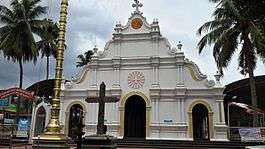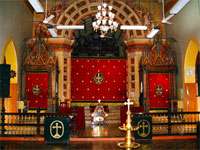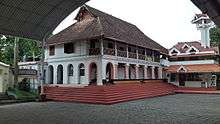Mulanthuruthy Marthoman Church
| Mulanthuruthy Marthoman Jacobite Syrian Cathedral | |
|---|---|
 Mulanthuruthy Marthoman Church | |
| Location | Mulanthuruthy |
| Denomination | Jacobite Syrian Christian Church |
| Tradition | Syriac, Malayalam |
| Website | mulanthuruthypally.com |
| History | |
| Founded | 1100 AD |
| Administration | |
| Diocese | Kochi diocese |

Mulanthuruthy Marthoman Jacobite Syrian Cathedral is located at Mulanthuruthy in Ernakulam district of Kerala. This church is among the ancient and famous churches of the Malankara Church and a pilgrimage center of Syrian Christians.[1] It is the home parish of Saint Gheevarghese Mar Gregorios of Parumala who was a Syrian Orthodox religious leader and later canonized by both the Jacobite Syrian Orthodox Church and Indian Orthodox Church.
This church is built between AD 1100 and 1125. Kunnassery Kunchakko Tharakan who was the minister of the king of Kaduthuruthy was instrumental in building this church. The noteworthy feature of this church is a relic of St Thomas, which was brought from Mosul. The Patriarch of Jerusalem, Mar Gregorius Yuhanon resided at this church from 1751 till he died on 10 July 1773. His grave can be seen on the northern side of the church.[2]
The church is famous for its historical importance. Mulanthuruthy church was the venue of the famous Mulanthuruthy Synod in 1876 convened by the Holy patriarch of Antioch Peter III.Patriarch Moran Mor Ignatius Yakoob III visited this church, during 1964. The present Patriarch Ignatius Zakka I Iwas have visited the Church twice, during 1982 and 2000.
The altar of the church is a reminiscent of the Altar of the first Christian Church of the Syrian Orthodox Church at Jerusalem. That is why, the Church is called as the 2nd Jerusalem. This church is also the home parish of the famous bishops of the Malankara Church known popularly as Kattumangattu Bavamar, the lone saint of the Malankara Church, Metropolitan Kochuparambil Paulose Mor Koorilose. Qasheesho Shrambikkal Pallathittayil Gheevarghese, the spiritual master of Gheevarghese Mar Gregorios of Parumala was laid to rest in this church on 23 December 1863.
The church is already attracting pilgrims from the different part of the world. The murals and the tombs of different bishops are attractions for the spiritual and religious tourists. This church is situated just 32 km away from Cochin International Airport
Mulanthuruthy
The history of Mulanthuruthy, a little village in the former Princely State of Cochin, in the early centuries of the Christian era, is obscure. Geologists are of the view that when the western part of Mulanthuruthy, was not yet formed by the mud and sand brought down by the periyar, the waves of the Arabian Sea washed the shore of this village. At that time, this village was a “Thuruthu” (Island) surrounded by “Mula” trees (Bamboo) and the name “Mulanthuruthy” was derived from that. Gradually, the sea receded surrendering large areas, now known as, Ernakulam, mattancherry, Vypeen etc. Christianity flurished in this village, immediately after the arrival of St. Thomas. This has remained a centre of Christian culture ever since.
Liturgy

The church uses the Syrian Orthodox Liturgy, which belongs to the Antiochene liturgical tradition. The East Syrian (Persian), Byzantine, Armenian, Georgian, Maronite liturgies also belong to the same liturgical family. In the first half of the fifth century, the Antiochene Church adopted the anaphora of Jerusalem, known under the name of St James, the brother of Our Lord.
Synod of Mulanthuruthy
The Synod of Mulanthuruthy was an important milestone in the history of St.Thomas Christians in the 19th Century. This Synod represents inauguration of an official relationship of a section of the Orthodox with the patriarch of the West Syrian Church. This Synod was called and Presided over by Patriarch Peter IV of the West Syrian Church. 103 churches of the Orthodox presented there but the churches followed Athanasius did not participate saying that this Patriarch has no right. So the Synod was the meeting exclusively that of the Dionysian party.

The Synod decided to adhere closely, with the West Syrian doctrinal, liturgical and Church disciplinary norms. And resolved a registered deed to be executed in this regard and presented to the Patriarch declaring the official adherence of this Indian section with the Patriarch accepting his jurisdictional claims. But unfortunately this registered deed was not executed and given to the Patriarch although the patriarch expected that would take place soon. Knowing that he was deceived thoroughly by Dionysius V he reacted as he desired. He consecrated 6 bishops of his own accord himself without the consent of the church or of Dionysius V, taking from each of them registered deed, to ensure and strengthen but also over their dioceses.
Indeed it was these new bishops formally and systematically not only West Syrianized their dioceses but also stabilized the jurisdictional claims of the Patriarch thereafter. Dionysius V was ignored by the Patriarch seeing that he was a threat and was against his plans regard to the Indian Church. Thus patriarch Peter organizing an independent hierarchy of his own in the Dionysian followers he left to Syria.[3]
See also
References
| Wikimedia Commons has media related to Mulanthuruthy Marthoman Church. |
- ↑ Thomas Joseph. "Marthoman Church, Mulanthuruthy". sor.cua.edu. Retrieved 2014-06-06.
- ↑ "Mulanthuruthy Marthoman Church in Mulanthuruthy India". india9.com. Retrieved 2014-06-06.
- ↑ "Malankara Orthodox Church - 19th century". malankaraorthodoxchurch.in. Retrieved 2014-06-06.